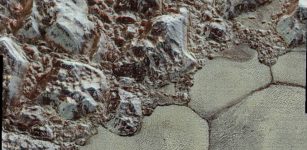Water On Mars May Be Still Present But It Is Locked Within The Planet’s Rocks – New Study
MessageToEagle.com – Today’s Martian surface is barren, frozen and inhabitable but once, the planet was warmer and wetter planet.
For now, it is not possible to answer the question of where the water on the planet went. However, new research suggests that this water is now locked within Martian rocks.
Previous research has suggested that the majority of the water was lost to space as a result of the collapse of the planet’s magnetic field, when it was either swept away by high intensity solar winds or locked up as sub-surface ice.
A team led by Dr Jon Wade, NERC Research Fellow in Oxford’s Department of Earth Sciences, applied modelling methods used to understand the composition of Earth rocks to calculate how much water could be removed from the Martian surface through reactions with rock. The team assessed the role that rock temperature, sub-surface pressure and general Martian make-up, have on the planetary surfaces.
The results showed that Martian basalt rocks can hold approximately 25 per cent more water than those on Earth, and as a result drew the water from the Martian surface into its interior.
“People have thought about this question for a long time, but never tested the theory of the water being absorbed as a result of simple rock reactions,” Wade said.
Minerals could be key to why Mars is uninhabitable.
The Earth, which has different mineral makeup, has never experienced these changes, but Mars is much smaller, further away from the Sun, and has more iron in its mantle.
“These are only subtle distinctions but they cause significant effects that, over time, add up. They made the surface of Mars more prone to reaction with surface water and able to form minerals that contain water. Because of these factors the planet’s geological chemistry naturally drags water down into the mantle, whereas on early Earth hydrated rocks tended to float until they dehydrate,” he concluded.
MessageToEagle.com
Expand for references










